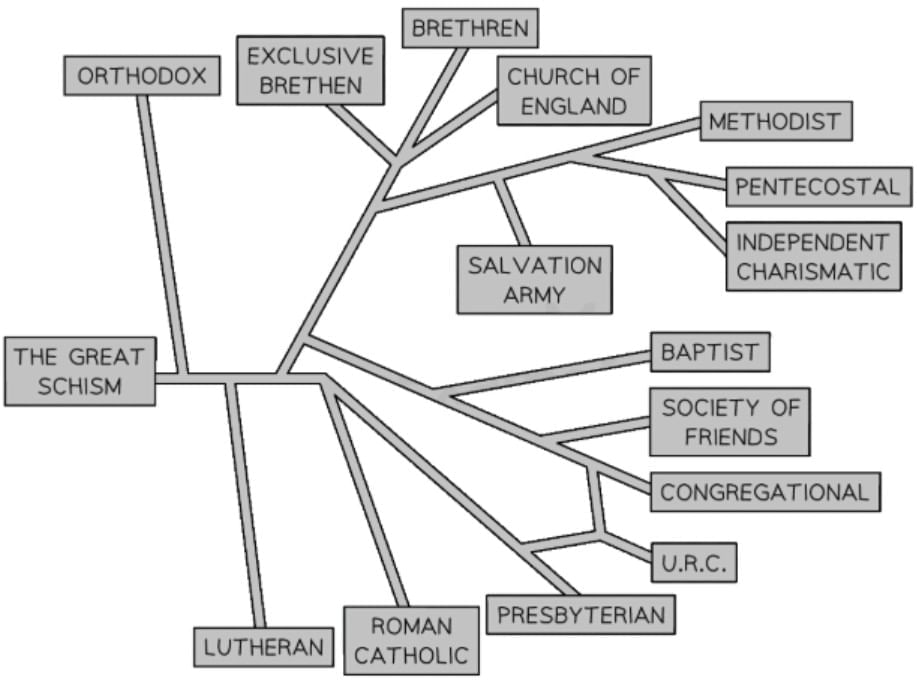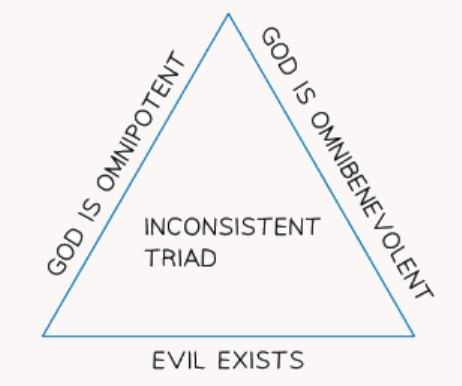Christianity & The Nature of God | Religion, Philosophy & Ethics for GCSE/IGCSE - Year 11 PDF Download
| Table of contents |

|
| Christianity |

|
| Denominations |

|
| The Nature of God |

|
| Other Characteristics of God |

|
| The Problem of Evil & the Christian Response to This |

|
Christianity
Christianity serves as the predominant religious tradition in Great Britain and is characterized by its vast diversity.
- Christianity is a prominent religion centered on the life and teachings of Jesus Christ.
- It is an Abrahamic and monotheistic faith.
- Other key Abrahamic religions include Judaism and Islam.
Denominations
- Christianity encompasses a wide array of denominations worldwide.
- These denominations vary in their histories, traditions, and styles of worship.
- Some, like the Roman Catholic Church and the Orthodox Church, boast memberships in the hundreds of millions.
- Others, such as the Pentecostal Church, are experiencing rapid global growth.
- In the UK, the Anglican denomination is the most prevalent, followed by Roman Catholics, Presbyterians, Methodists, and Baptists.
- Despite their differences, all denominations fall under the umbrella of Christianity.
- They share a belief in one God, adhere to Jesus’ teachings, and regard the Bible as their sacred text.

The Nature of God
The Nature of God: Omnipotent, Loving & Just
Christians attribute several qualities to God, some of which humans can aspire to, while others are unique to God.
Five significant qualities include:
- Omnipotence
- Just
- Omnibenevolence
- Immanence
- Transcendence
How are these qualities demonstrated by God?
Omnipotence
- God is the creator of the universe and all that exists within it.
- His omnipotence is evident in the miracles performed by Jesus, as described in the Bible.
'nothing will be impossible with God’ (Luke 1: 37)
Just
- God, with His boundless power and authority, is seen as the ultimate source of justice.
- As an all-loving deity, He opposes injustice, mistreatment, prejudice, or oppression.
- God provided Moses with the Decalogue, setting forth guidelines for human behavior.
‘let justice roll like a river’ (Amos 5: 24)
- In the Parable of the Sheep and Goats, Jesus taught that God judges individuals based on their care for others.
‘In everything, do to others what you would have them do to you’. (Matthew 7:12)
Omnibenevolence
- God created humans in His own image (Genesis 1:27), reflecting His love for His creation.
- His love is so profound that He sacrificed His only Son, allowing Jesus to be crucified to save humanity.
- In the Sermon on the Mount, Jesus shared teachings that emphasize God’s love.
‘Love your neighbour and hate your enemy. But I tell you, love your enemies and pray for those who persecute you’ (Matthew 5: 43)
Immanence
- God’s immanence signifies His presence throughout His creation.
- This belief holds that God is present everywhere, yet remains distinct from His creation.
‘One God and Father of all, who is above all, and through all, and in you all’ (Ephesians 4: 6)
Transcendence
- God holds authority and control over His creation.
- He exists beyond the full scope of human experience, perception, or comprehension.
‘As the heavens are higher than the earth, so are my ways higher than your ways and my thoughts than your thoughts’ (Isaiah 55: 9)
Why are these qualities important to believers?
Omnipotence
- Christians draw strength and perseverance from God’s omnipotence when facing challenges.
- They trust that God has a divine plan for everyone, guiding their lives.
Just
- Christians strive to promote justice in society, reflecting God’s just and compassionate nature.
- They consider the consequences of their actions, seeking God’s approval on the Day of Judgment and believing that wrongdoing will be addressed.
Omnibenevolence
- Christians aim to embody love in their daily lives by following the Golden Rule.
- They demonstrate agape by loving even their enemies.
Immanence
- God’s immanence means He is aware of and compassionate toward human suffering and sin.
- This belief provides comfort, as Christians feel God’s constant presence.
Transcendence
- God’s transcendence grants Him the ability to heal, save, and redeem.
- His capacity to perform miracles offers hope to those facing difficulties, surpassing human limitations.
Other Characteristics of God
God can be perceived as either personal or impersonal.
- A personal God has human-like traits, enabling a relationship through prayer and personal experience.
- An impersonal God transcends human understanding and lacks human characteristics.
Eternal
- God is eternal, existing forever without beginning or end.
- Unlike humans, He is unbound by time.
The Problem of Evil & the Christian Response to This
The Problem of Evil
Evil and suffering are present in the world.
Evil is categorized into two types: Moral Evil and Natural Evil. Christians believe God is omnipotent (all-powerful), omnibenevolent (all-loving), and omniscient (all-knowing), which raises questions about the existence of evil.
The presence of evil suggests several possibilities:
- God lacks the power to eliminate evil.
- God is unaware of evil’s occurrence.
- God does not care enough to stop evil.
Since Christians affirm God’s ability to address evil, this leads some to question His existence. Philosopher John Mackie framed this as the “inconsistent triad,” suggesting that if evil exists, then:
- God is omnipotent but not omnibenevolent, or
- God is omnibenevolent but not omnipotent, or
- God does not exist.

How Christians Respond to the Idea of Evil and Suffering
God granted humans free will, allowing them to choose between good and evil, unlike programmed machines.
- When people choose evil, suffering results.
- Some Christians view life as a test, where responses to suffering and evil determine one’s fate in the afterlife, as illustrated in the Book of Job.
- Others believe that “God works in mysterious ways,” with reasons for allowing evil and suffering that humans cannot fully comprehend, as part of His divine plan.
How Christians Physically Respond to Evil and Suffering
Christians follow Jesus’ teachings and example in addressing evil and suffering.
- Prayer: Christians pray for those who suffer, using intercessory prayer, a common practice in most Christian worship.
- Service: Christians actively assist those in need, volunteering in hospitals and hospices, providing food and clothing for the homeless in the UK, and raising funds to support less developed countries.
|
172 docs|3 tests
|
FAQs on Christianity & The Nature of God - Religion, Philosophy & Ethics for GCSE/IGCSE - Year 11
| 1. What are the main denominations of Christianity, and how do they differ in beliefs and practices? |  |
| 2. How does the nature of God as omnipotent, loving, and just influence Christian beliefs? |  |
| 3. What is the Christian response to the problem of evil and suffering? |  |
| 4. How do Christians physically respond to evil and suffering in the world? |  |
| 5. Why are the qualities of God as loving, just, and omnipotent important to believers in their daily lives? |  |














